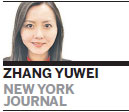Following Chinese PC maker Lenovo's purchase of IBM's personal computing division in 2004, the company realized it was important to make further big moves to get the brand recognition outside China. They set up co-headquarters in Raleigh, North Carolina, to make the company a truly global brand.
About a decade later, China is attracting foreign firms to do something similar to what Lenovo has done to gain growth in the world's No 2 economy.
Milwaukee-based Johnson Controls is building its dual headquarters in Shanghai, showing the company's commitment to a strong industry leadership presence in China.
Alex Molinaroli, CEO of Johnson Controls, said China is an opportunity to embrace.
"We are never going to be as successful as we could be if we try to do everything from our leadership headquarters in North America," Molinaroli said after a recent investors meeting in New York.
Saying that most of their experiences in China have been positive, particularly through automotive joint ventures, the company has good relationships with local companies there, he said.
"I see us becoming an incredible partner with the Chinese people and with other companies in certain markets," he added.
In order to have more growth coming out of the Chinese market, the company plans to put part of its leadership in the Shanghai headquarters.
"For us to be at the next level, we have to be there," said Molinaroli.
The American company that offers products and services to optimize energy and operational efficiencies of buildings, automotive batteries, electronics and interior systems for automobiles are making this effort for a reason.
In its recent investors meeting in New York City, the company said China is a "growth opportunity across all of the company's businesses", representing more than $8 billion in annual revenues in fiscal 2014.
Johnson Controls' new 35,000-square-meter corporate headquarters, located in the Changning District, is expected to be completed by late next year. The new site could allow the company to relocate 1,200 employees, including some senior executives from the Milwaukee base.
The company has some big expectations for the Chinese market where it expects global automotive production to increase across all key regions, led by an expected 10 percent growth rate in China.
The company entered the Chinese automotive supply market with batteries about 10 years ago. The industrial pace in China has created opportunities for companies like Johnson Controls, whose revenues from China have grown from $2.9 billion in 2009 to more than $7.2 billion in 2014.In June, the company announced plans to expand its automotive battery production capacity in China with the establishment of a new plant in western China's Chongqing.

Despite all the big hopes for the Chinese market, the company faces challenges such as local branding, especially for a business-to-business firm.
Kim Metcalf-Kupres, vice-president and chief marketing officer of Johnson Controls, said they try to do things differently from other multinationals in China.
"We never used China as a manufacturing base - our investment in China has always been about serving the Chinese market," said Metcalf-Kupres.
"As the relationship continued to evolve, we increasingly brought technology to the table, in a way that some other multinationals could not," said Metcalf-Kupres.
For the company to build its brand for the long term in the Chinese market, building trust with local partners is crucial, noted Molinaroli.
"That for us - to have that level of trust and being trusted that much by our customers - says a lot about our people," Molinaroli said.
Contact the writer at [email protected]